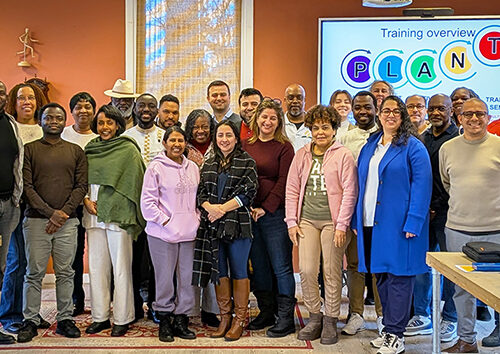11 February 2021 | Binfield, UK [Helen Pearson]
‘Re-imagining’ was a key word in Newbold’s first Diversity Lecture of 2021 on Tuesday, 9 February. After environmental disasters, God works in nature giving it an infinite capacity to bounce back. Similarly, God can work through leaders who model and encourage a re-imagining of the church in the wake of the pandemic.
 The speaker at the lecture was Dr Steve Aisthorpe – Mission Development Worker for the Church of Scotland – a specialist in leadership, a committed environmentalist, and an experienced mountaineer! His lecture was an extended exploration of the metaphor of ‘wilding’ as it might apply in these days when the pandemic has affected the church like an earthquake or other natural shock.
The speaker at the lecture was Dr Steve Aisthorpe – Mission Development Worker for the Church of Scotland – a specialist in leadership, a committed environmentalist, and an experienced mountaineer! His lecture was an extended exploration of the metaphor of ‘wilding’ as it might apply in these days when the pandemic has affected the church like an earthquake or other natural shock.
At the heart of Dr Aisthorpe’s vision is a Jesus-centred church where all relationships are coloured by adventurous discipleship. It’s a different picture perhaps from the highly organised, top-down, institutions many think of as ‘the church’. He quoted theologian Rowan Williams: ‘church is what happens when people encounter the Risen Jesus and commit themselves to sustaining and deepening that encounter in their encounter with each other’. Vision is a core skill in Jesus-centred leadership. Contextual intelligence and the ability to see beyond the boundaries of one’s own tradition are valued qualities. ‘Leaders need to be ready to update their mental maps,’ said Aisthorpe. They need to be able to make connections beyond the boundaries of their own time and tradition – inter-personal, organisational, theological, philosophical.
As the lecture progressed, it became clear that the leadership qualities Aisthorpe was describing were part of a vision of church in which ‘leaders’ and ‘followers’ were less rigid categories. Leaders needed to foster low-control cultures of experimentation and mutual learning without fear of failure. An emphasis on high accountability meant that there would be a strong sense of shared ownership and responsibility for the church with a great deal of mutual, high-attention and prayerful listening. Leaders, he suggested would avoid the two extremes of religious navel-gazing and frenetic pious activity while cultivating a ‘rhythm of listening and action’. ‘Listening,’ he suggested is the heart of the adventure of faith. It’s scary because you don’t know what you’re going to hear until it is too late’.
This lecture imitated the teaching style of Jesus in its reliance on the sort of metaphors which helped us ‘to imagine how things can be but are not yet’. Aisthorpe suggested that ‘a church unchanging’ can look like a sinking liner. Smaller, more flexible craft – rafts, rowing boats, sailing ships and barges may be able to rescue those falling from the ‘sinking ship’ of traditional church. He described contemporary leaders who would be ‘less like orchestra conductors and more like jazz musicians’. His vision was of a move away from a homogeneous church which would be ‘more like a wildflower meadow and less like a manicured lawn’. There would be ‘new species’ – rather like the beavers who have been reintroduced to the UK after centuries of absence and are not only thriving here but strengthening the eco-systems.
The sub-title of the lecture seemed to have struck a chord as the Church struggles with the challenges of the pandemic! Over 100 people registered for the lecture and 74 ‘attended’ on the night with hundreds more watching on Facebook. Many wanted the details of Dr Aisthorpe’s book Rewilding the Church and the exclusive discount available to participants in the lecture.
And participation levels were high during the 40-minute Q&A session which followed the lecture. Questions flooded in from church leaders and followers. ‘Where to start’? How to relate to congregations split between traditional and progressive members? How to reconcile vision-casting and the uncertainty of listening? How to cope with unimaginative and non-listening leaders? Is there a future for church buildings and cathedrals and the institutional church? Is there a danger of doctrinal impurity and schism? There wasn’t time to answer all of them, but clearly Dr Aisthorpe had stirred up a lot of re-imagining – especially in the mind of one questioner who asked, ‘Is the Holy Spirit maybe more like a wild goose than a dove?’
The full recording of the lecture can be seen here.
tedNEWS Staff: Victor Hulbert, editor; Deana Stojković, associate editor
119 St Peter’s Street, St Albans, Herts, AL1 3EY, England
E-mail: [email protected]
Website: www.ted.adventist.org
tedNEWS is an information bulletin issued by the communication department of the Seventh-day Adventist Church in the Trans-European Division. Readers are free to republish or share this article with appropriate credit including an active hyperlink to the original article.



